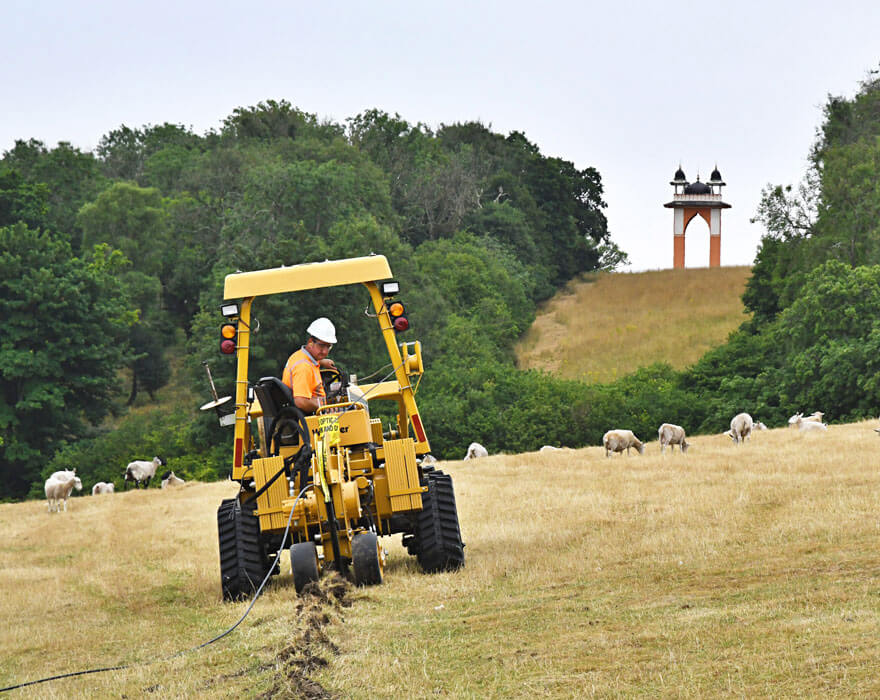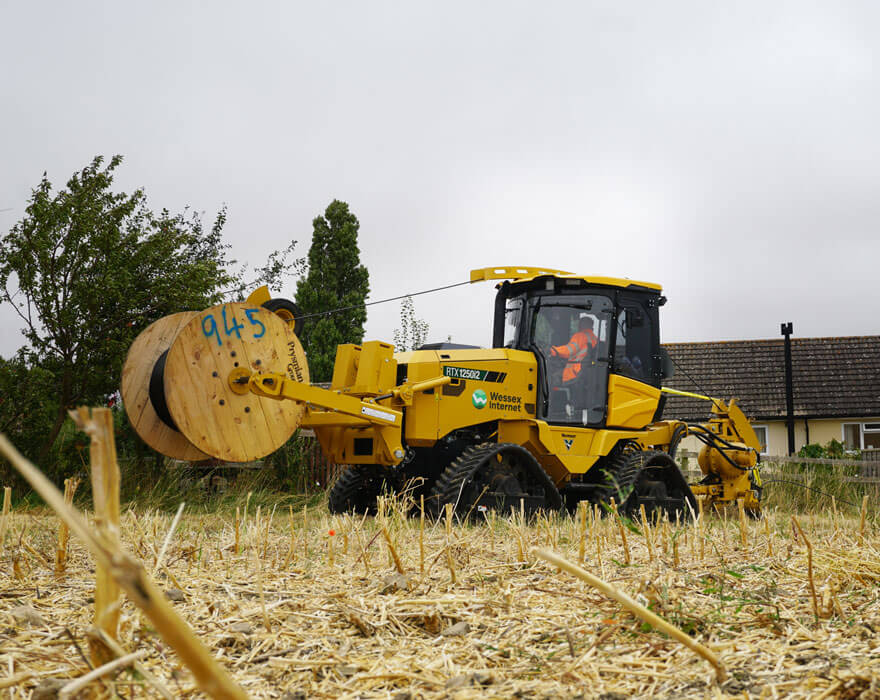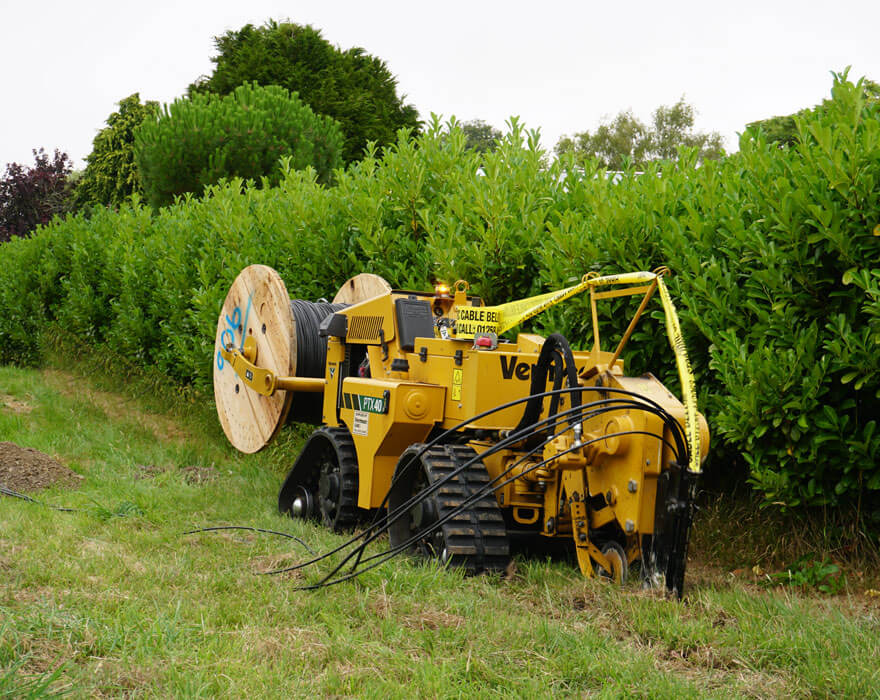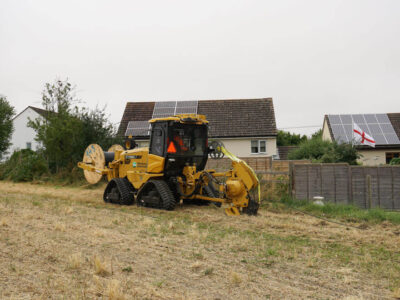Updated February 7, 2024
Wessex Internet, an internet service provider based in rural southwest England was born out of necessity. The team realized that rural communities and businesses in their region were struggling to access high-speed internet. The cost of building infrastructure in these areas was prohibitively high for most operators across the country, leaving those who needed connectivity the most without access.
This frustrating realization is where the story of Wessex Internet begins — a company committed to building infrastructure and providing connectivity to those that need it most.
The beginning of Wessex Internet
James Gibson Fleming, the founder of Wessex Internet, faced this issue firsthand. When he sought high-speed internet for his farm in 2010, the best connection available was just .5 megabits per second through an outdated copper line. That low speed made life difficult then, but fast forward a decade and that speed is nearly inadequate for modern life. In today’s post-COVID-19 era, and an increasing reliance on cloud-based services, good connectivity has become a necessity.
When the U.K. national telecommunications network operator provided an exorbitant quote for high-speed internet installation, Gibson Fleming decided to take matters into his own hands. He launched his own internet service provider to connect his farm and, eventually, other rural communities in need.

A journey toward full-fiber technology
Gibson Fleming initially used a fixed-point wireless system, using a microwave and line-of-sight link to provide connectivity from a mast to the customer. However, as the network expanded and customer demands grew, the need for greater bandwidth became evident. This led to the adoption of fiber optic cable links to maximize the network’s capabilities.
With increased demand and government subsidies available for connecting rural areas, the company shifted its focus toward full-fiber technology. Full-fiber technology involves running optical cables directly to each connected property, in contrast to the older approach of fiber to the cabinet and copper cables to the property. This approach is considered the future of connectivity — not only in the UK but around the world. Wessex Internet continues to maintain its fixed-point wireless network, connecting new customers to it, but no longer expanding the network. In coming years, most customers will soon migrate to the expanding fiber network.
The most pressing challenge for Wessex Internet is to scale up the rate of network expansion across rural areas. Wessex Internet achieves this through direct labor teams and a unique approach to engaging local communities and landowners. This collaborative effort helps bring next-generation full-fiber connectivity to people who might otherwise remain disconnected.

Building a collaborative culture
Efficiency and collaboration are at the heart of Wessex Internet’s rural-build model. Crews collaborate closely with local communities and landowners to ensure that the installation of full-fiber technology causes minimal disruption to the landscape. This is not always an easy task — some terrain in rural England can pose a set of challenges. Encountering these challenges led Wessex Internet to recruit engineers and operators locally, leveraging their knowledge of the countryside and problem-solving skills to get the job done quickly and efficiently.
“Often these crews have experience working on the land and understand the countryside. They’re used to thinking on their feet, solving the inevitable problems that arise and getting the job done to get customers connected quickly and cleanly,” Ludo Skinner, Infrastructure Director at Wessex Internet explained. “That’s in large part to using efficient methods and machinery. The cooperation of landowners depends on leaving their land as we found it, by keeping disruption to an absolute minimum. And a project only makes economic sense if it’s realized on time and on budget.”
One of the tools enabling efficient fiber installation is the Vermeer RTX550 ride-on tractor with a plow attachment. The quad-tracked vehicle can handle uneven terrain, making precise incisions in the ground as it advances. The plow blade, mounted at the rear on a vibrating hydraulic arm, creates an incision in the ground through which the communication cables have been pre-laid or are fed with a tractor-carried spool.
Charlie Ormerod, a foreman at Wessex Internet explained, “When we’re laying cables, all that you’ll see at the surface is a cut mark. Even that’ll be invisible in a matter of weeks. This is in a completely different league to traditional trenching which is way more time-consuming and therefore expensive — and that’s before you consider the disruption that would cause to the landowners and long-lasting scar it leaves. So plowing is a game-changer for us.”
The Vermeer RTX550, with its balance of size and power, provides Wessex Internet with the right tool for the job. Wessex Internet operator Dave Burford values the design and features that make machine operation more comfortable. “I’ve worked on some bumpy rigs in my time,” he said. “But the Vermeer cab is great. Much less vibration and noise, all the controls where you want them, with a clear view front and rear, so you can see exactly what you’re doing.” The RTX550 has an optional remote control for convenient maintenance and trailer loading, plus telematics for optimizing productivity. Additionally, the RTX550 tractor can be combined with a variety of attachments to better suit the job ahead, making it a versatile machine for many fleets.
Wessex Internet is not limited to a single plow; they have a range of Vermeer plows at their disposal. “Of course, the RTX550 isn’t ideal for every situation,” Skinner clarified. “With a plow, there’s always a trade-off between size and power on the one hand, and maneuverability and accessibility on the other — let alone purchase cost against the required output. The bigger and more powerful the machine, the deeper you can install a larger product, and the faster you can get the job done. But the harder it is to get to awkward places, and the more impact you have at the surface.”
Larger Vermeer plows like the RTX1250 ride-on tractor are used for cross-country installation of the main network, while smaller models like the PTX40 plow/trencher excel at short residential installations with lighter cables, ensuring that the right-sized machine is available for every project phase. Skinner expressed that the RTX550 is the sweet spot for them, offering a smaller machine with capabilities to install larger product quickly.
While the RTX1250 is similar to the RTX550 — but with nearly double the gross horsepower — the PTX40 is a different experience for operators at Wessex Internet.
When running a PTX40, operators are walking beside the machine and using a remote control to maneuver the plow/trencher. visibility around the machine allows the operator to monitor the cutting process and adjust as needed. “If we’re connecting residential developments, we often need to get through narrow gaps and lay cables with the minimum noise and surface disturbance,” said Skinner. “The PTX40 is ideal for that kind of work. Its footprint is really small — it’s a couple of meters long and a meter or so wide. And because it’s pivot steer, we can get it around tight corners. It lets us plow right down to about 60 cm, albeit varying in different soil types, without doing any significant damage to the surface.” Wessex Internet uses the PTX40 to install fiber optic, but other companies commonly use it for electrical, gas and irrigation services as well.

A commitment to connection
Doing business with a Vermeer dealer means gaining an extensive support network. Wessex Internet has experienced this unwavering support since they began working with Vermeer U.K. in 2017. Now, they run a growing fleet of plows ranging in size from SPX25 vibratory plows and PTX40s through RTX1250s. Jason Barnes, a utility and pipeline specialist at Vermeer U.K. has supported Wessex Internet in many ways — especially when it comes to optimizing machine performance, pros and cons to different blades and how to help extend the working life of high-wear components. “Direct, in-person support is central to the way we operate at Vermeer,” said Barnes. “For us, the sale of a machine isn’t an end point, it’s the starting point for building a long-term relationship.”
Wessex Internet strives to install and build a network as cost effectively as possible. Skinner said, “The Vermeer plows have helped us keep our costs down and underpin the business case for bringing full fiber to the most rural parts of our area.”
But operational efficiency isn’t just about machine specs. “The backup we get from Jason and his colleagues — and the technical team over in Iowa — matters too. There are a lot of parallels between Wessex Internet and Vermeer: the agricultural background, the emphasis on relationships, the hands-on, result-focused approach,” Skinner explained. “State-of-the-art digital technology is what Wessex Internet delivers, but our ability to deliver is based firmly on traditional community roots. Like Vermeer.”
Wessex Internet’s dedication to delivering high-speed internet to rural communities is unwavering. Their approach, involving local expertise and innovative plowing technology, aims to close the digital divide. With reliable, high-speed internet access, rural communities can thrive and remain connected to the modern world — an essential service now more than ever.
To learn more about utility installation equipment, contact your local Vermeer dealer.
This article contains third-party observations, advice or experiences that do not necessarily reflect the opinions of Vermeer Corporation, its affiliates or its dealers. Testimonials and/or endorsements by customers in specific circumstances may not be representative of normal circumstances experienced by all customers.
Vermeer Corporation reserves the right to make changes in product engineering, design and specifications; add improvements; or discontinue manufacturing or distribution at any time without notice or obligation. Equipment shown is for illustrative purposes only and may display optional accessories or components specific to their global region. Please contact your local Vermeer dealer for more information on machine specifications.
Vermeer and the Vermeer logo are trademarks of Vermeer Manufacturing Company in the U.S. and/or other countries. © 2024 Vermeer Corporation. All Rights Reserved.
